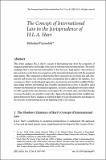|
Reseña:
|
This article analyses H.L.A. Hart's concept of international law from the perspective of anaytical jurisprudence and in light of the state of contemporary international law. The article challenges Hart's view that international law is law but not a legal system. Hart arrives at this conclusion on the basis of a comparison of the international legal order with the municipal legal system. This comparison is distorted by Hart's general focus on private law and criminal law and becomes less convincing when constitutional law is added to the equation. As a consequence, Hart's methodological approach is inconsistent and should be modified. Rather than asking whether international law resembles municipal law in form, it should be asked whether international law encompasses legislative, executive, and judicative structures which are able to perform the same functions as the legal order of a nation state, and which thereby overcome the defects of a primitive social order. Against the background of this modified analytical framework, Hart's analysis is revisited in light of recent developments and changes in the structure of international law at the beginning of the 21st century. |

